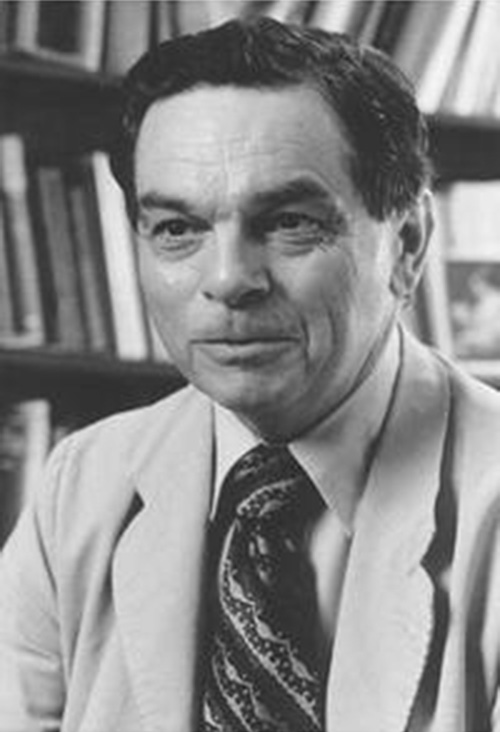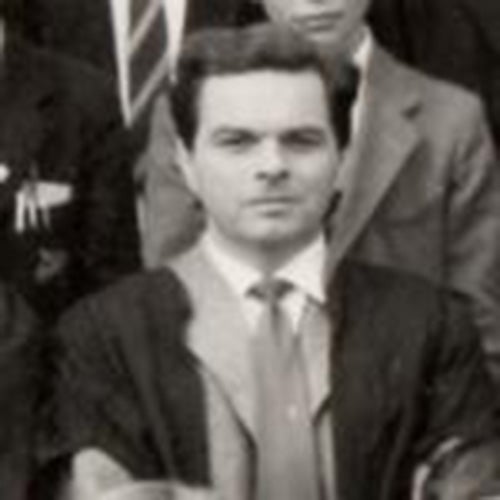Gareth Morgan Memorial Endowed Excellence Fund
Professor of Classics Gareth Morgan was educated at Oxford and began his thirty-year career at The University of Texas at Austin as a visiting associate professor in 1966-67. Morgan was a remarkable polymath who did not recognize the common distinctions between primary and secondary, research and teaching.
In the Department of Classics, he was best known for his unfailing dedication to the comprehension and performance of ancient texts. He taught Greek, ancient to modern, including one of the country’s best summer intensive programs. He also taught Welsh. His language teaching methods were literally inimitable. Gareth prepared his students to read ancient texts accurately and fluently, to appreciate the sound of ‘dead’ languages, which he brought to life.

Gareth hosted daily noontime readings of Greek and Latin in his office on the ground floor of Waggener Hall unfailingly for nearly twenty years. Five or six times per academic year, and several times during the season of his renowned summer course, Gareth and his wife Joan would host performances of Classical drama or readings of poetry at their home on Rollingwood Drive. As with the daily readings, all who were interested in Greek or Latin literature were welcome.
The highlights of both the readings and the performances were Professor Morgan’s own lively and impeccable pronunciation of Greek and Latin verse, and his obvious rapport with all who shared his passion. He also had a sly wit in casting the parts played by faculty and students – an undergraduate Xanthias would cherish the opportunity to have a hand in the whipping of his professor Dionysus. Participants often came to know themselves differently as a result of experiencing one or several Gareth productions.
Professor Morgan was an important advocate for better teaching of Latin in Texas elementary and secondary schools. A great number of Texas Latin teachers were his students. He taught the required graduate course in the teaching of Latin with scrupulous care for pedagogy. Many others learned better ways to teach Latin through his work as editor of the journal of the Texas Classical Association. His visits to schools throughout the state are still remembered as inspirational occasions.

A long-time colleague of Gareth’s at the University remarked: ”The more I think about the remarkable question of why the largest and one of the best Classics programs in North America developed in Austin over the last quarter century, the more I come up with Gareth as the answer. He was central to everything the rest of us did, providing a unity with his absolute devotion to the one thing we really had in common—the word, the spoken word. He didn’t determine what others did, but he reminded them why they were doing it. The underrated virtue of persistence, of keeping at it, of being there, he possessed as none other. Years came and went and Homer and Virgil were always read at noon, and Greek tragedy and comedy always performed on fairly frequent Fridays, and the elements of Greek forever implanted in the summers. The ritual went on, the continuous celebration of the department’s meaning, the things we all, at whatever remove, still shared. This was important, too. Everyone was welcome. Come in and pick up a book and read what you can; desire, not competence, was the criterion. If Gareth unified the horizontal splaying of the Classics, the specialties, he overrode the vertical hierarchy, too. Students, faculty, alumni, interested bystanders—all acted together in Morgan’s Saturnalia.”
Gareth Morgan’s passion for theater also led him to play many roles on the local stage. Again with his wife Joan, he stood as the unwavering force for weekly Sunday readings of Shakespeare that operated according to the same all-inclusive and inviting principles that guided his noontime readings of Latin and Greek and his performances and readings of the Greek and Latin classics.
One of Gareth Morgan’s continuing contributions to UT Austin was his posthumous donation to The University of Texas at Austin library system of some 2500 books and scholarly journals in Classics, medieval and modern Greek, Welsh, folklore, and the general study of language. He is a true Longhorn, having received an MA in Liberal Arts in 1970.
This endowment was created in 2002 with funds provided by friends and colleagues and Charlotte W. Rhodes, Ph.D. (’71). The intention is to support programmatic needs for the Classics and/or Philosophy departments.
How to Give
Learn more at giving.utexas.edu
Search Endowments
Look for inspiring stories
